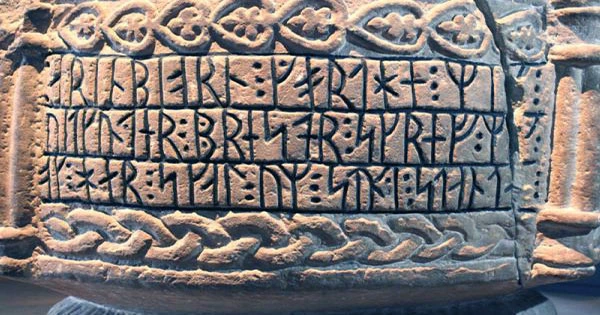Archeologists occasionally come upon something that exemplifies how far we’ve progressed as a species. For example, humans used to bathe in cursed water and mummify monkeys, both of which we’ve nearly fully abandoned in recent years. Other times, a finding reveals how similar we are to our forefathers. That’s the case with a nearly two-thousand-year-old marble tablet whose ancient Greek writing has turned out to be essentially a class yearbook.
“The inscription is a list of friends who went through the ephebate, a year of military and civic training for young men, together,” explains a note on the tablet’s translation, which was published last week by Attic Inscriptions Online, a research project aimed at finding, translating, and publishing all 20,000 or so Athenian inscriptions currently held in UK collections.
The notes go on to say that “the thirty-one ephebes included in this list constitute a subset of the whole cohort, which is estimated to have had over a hundred young males.” “The ephebes are all referred to by their given names solely, with no patronymics or demotics, presumably as an egalitarian touch that hides disparities in socioeconomic background.” Several of the ephebes are unusually named with shorter (“hypocoristic”) variants of their names, such as Theogas and Dionysas for Theogenes and Dionysodoros (roughly equivalent to “Pete,” “Steve,” or “Chris” in English).”
The find is noteworthy, not least because the tablet was discovered in Scotland, over 3,000 kilometers away from its original Athenian location. That’s because it’d been in storage for more than a century, and it was first thought to be a replica of another tablet kept at the Ashmolean Museum in Oxford, England. However, Peter Liddel told NPR that “when we looked a little closely at this inscription, we realized that it was in reality a new document.” Liddel is a professor of Greek history and epigraphy at the University of Manchester in England, as well as one of the tablet’s three translators. He also serves on the editorial council of the Attic Inscriptions Online project.
“It’s really amazing because this is one of a tiny handful of inscriptions in Scotland, one of three ancient Athenian inscriptions in the city of Edinburgh,” Liddel told NPR. He went on to say that it’s “very unlike anything known previously.” Fortunately, the tablet’s author — Attikos, Philippos’ son – was nice enough to date the yearbook for future academics. The last line of the class list reads, “Of Caesar” – a reference to Tiberius Claudius Germanicus Caesar, according to the academics.
Claudius was the Roman Emperor who ruled from 41 to 54 CE, and it’s rather ironic that the tablet was discovered in the United Kingdom, given that Claudius was the emperor who placed Britain under Roman dominion. Ephebes were taught to conceive of serving the Emperor as a key element of their identity at Athens, which had surrendered to Rome centuries earlier and had already survived revolts and re-conquest by the time the tablet was inscribed.
While we may be aware of such political and military events, the ordinary banalities of existence are frequently beyond our comprehension. For that reason, according to Liddel, this ancient Athenian yearbook, penned by a child to memorialize his classmates exactly as he knew them, is a priceless find. He stated, “We don’t have objective accounts of ancient history.” “We have to piece old history together from the bits that survive, and this is one of them.”
















